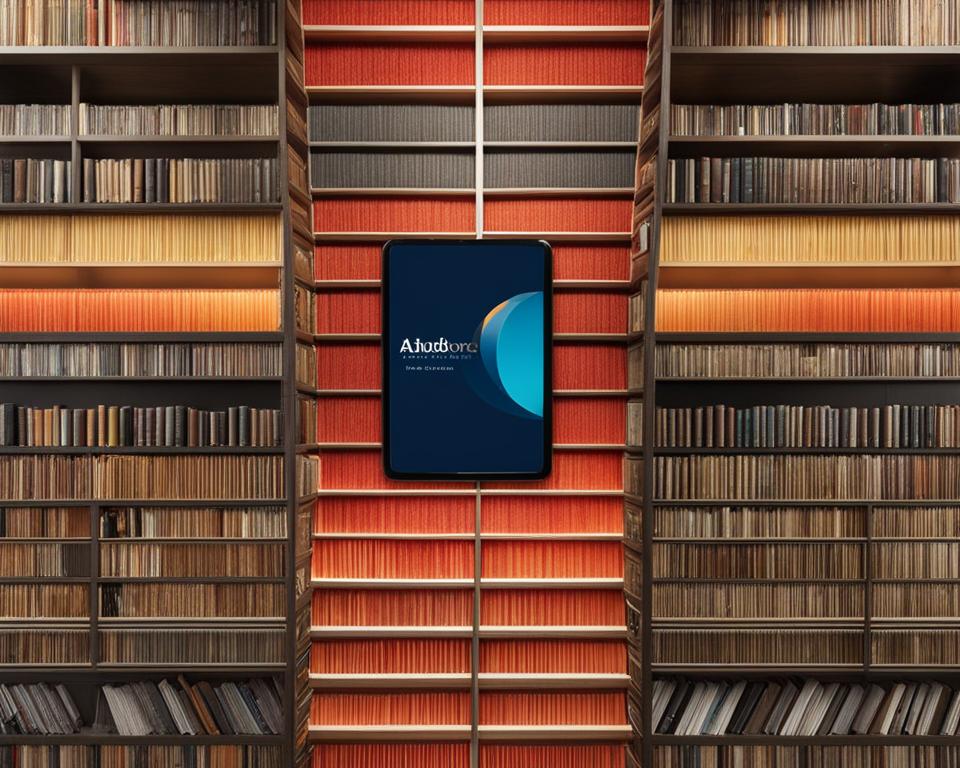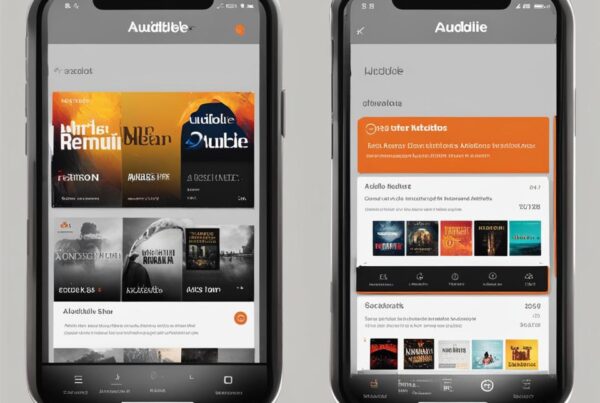Are you confused about the difference between Audible and audiobooks? You’re not alone. Many people use these terms interchangeably, but they actually refer to two different things. In this article, I will decode the differences between Audible and audiobooks, helping you discover which option is right for you.
Audible is a platform that offers audiobooks as well as podcasts, original content, and more. It’s owned by Amazon and has an extensive library of over 500,000 titles. Audiobooks, on the other hand, are simply audio recordings of books that can be purchased or borrowed in various formats.
While both Audible and audiobooks provide a convenient way to consume literature, there are some key differences that are worth exploring to help you make an informed decision.
Key Takeaways:
- Audible is a platform that offers audiobooks, podcasts, and original content.
- Audiobooks are simply audio recordings of books.
- Both Audible and audiobooks provide a convenient way to consume literature.
- Understanding the differences between Audible and audiobooks can help you find your ideal listening experience.
- In the following sections, we will explore Audible and audiobooks in more detail.
What is Audible?
Let’s start by decoding what Audible is and what makes it stand out from audiobooks. Audible is the world’s largest producer and provider of audiobooks, offering a massive library of over 500,000 titles in various genres, including fiction, romance, non-fiction, and more. Audible is available as a mobile application and a website, allowing you to access your favorite audiobooks anywhere and anytime.
Audible’s Membership Options
Audible offers a variety of membership options to suit your needs and preferences. The most popular membership is the Gold membership, which costs $14.95 per month and includes one credit that can be redeemed for any audiobook regardless of its price. If you’re an avid listener, you may prefer the Platinum membership, which costs $22.95 per month and includes two credits. Audible also offers a membership plan for occasional listeners, called Audible Plus, which costs $7.95 per month and provides access to a selection of audiobooks and exclusive podcasts.
Audible’s Unique Features
Audible’s platform is designed to enhance your listening experience with features that make it easy and convenient to use. One of the most notable features of Audible is its offline listening capabilities. With Audible, you can download audiobooks to your device and listen to them without an internet connection, making it ideal for long flights, road trips, or areas with poor internet connectivity. Additionally, Audible allows you to bookmark specific points in the audiobook, adjust narration speed, and set a sleep timer to help you fall asleep without missing any part of the story.
What Sets Audible Apart from Other Platforms?
Audible’s vast library, exclusive content, and unique features make it a top choice for audiobook enthusiasts. Unlike other audiobook platforms, Audible produces and publishes its own audiobooks, meaning you can find titles that you won’t find anywhere else. Audible also offers a Great Listen Guarantee, which allows you to return any audiobook you’re not satisfied with and receive a credit for another title.
Overall, Audible’s extensive library, membership options, and unique features make it a must-try for anyone looking for an immersive listening experience.
What are Audiobooks?
Before we explore the differences between Audible and audiobooks, let’s first define audiobooks. Simply put, audiobooks are audio recordings of books that you can listen to instead of reading them. This means you can enjoy your favorite books while driving, cooking, or doing any other activity that doesn’t require your full attention.
Audiobooks come in various formats, including CDs, MP3s, and digital downloads. The most popular format nowadays is digital downloads, which you can listen to on your smartphone, tablet, or computer. This provides a level of accessibility that traditional books simply cannot match.
Accessibility is a crucial feature of audiobooks, as it allows people with visual impairments to enjoy books just like anyone else. Moreover, it opens books up to a wider audience, including those who may not have the time or energy to read a physical book.
One of the unique features of audiobooks is that they often include character voices, sound effects, and music, making the listening experience more engaging and immersive. By hearing the intonation and inflection in the narrator’s voice, you can gain a deeper understanding and appreciation of the story.

As you can see from the accompanying image, audiobooks come in a variety of digital formats, allowing for greater convenience and accessibility.
Features of Audible
As a dedicated audiobook platform, Audible offers a range of features and benefits that make it an appealing choice for book lovers. Let’s explore some of these features in more detail.
Extensive Library
One of the most significant advantages of Audible is its vast library of audiobooks. With over 600,000 titles to choose from, there is something for everyone, including bestsellers, classics, and new releases. In addition, Audible continues to add new titles regularly, ensuring that users always have fresh content to explore.
Offline Listening
Audible’s offline listening feature enables users to download audiobooks and listen to them without an internet connection. This is especially convenient for those who frequently travel, have limited data, or experience spotty internet coverage. Additionally, downloaded audiobooks can be easily accessed from the user’s library, making it simple to switch between titles on the go.
Membership Benefits
Audible offers several membership options, including monthly or annual plans that come with varying levels of benefits. For example, Audible Premium Plus membership provides users with access to exclusive sales, unlimited listening to select audiobooks, and credits that can be used to purchase new titles. Additionally, Audible members can take advantage of discounts on audiobooks and receive priority customer support.
Additional Perks
Aside from its extensive library and membership benefits, Audible offers several additional perks to enhance the user experience. These include the ability to adjust the audio speed, set sleep timers, and sync progress across multiple devices. Additionally, Audible users can earn badges and rewards for completing certain listening milestones, adding a fun and engaging element to the listening experience.
Overall, Audible’s features make it a top choice for those looking to delve deeper into the world of audiobooks. Whether it’s the extensive library, offline listening, or membership benefits, Audible has something for every type of listener.
Comparing Audible and Audiobooks
Now that we have explored the features of Audible and what audiobooks are, it’s time to compare the two and weigh their pros and cons.
Audible
Firstly, Audible offers a vast collection of audiobooks, with over 600,000 titles to choose from. Its membership plans provide access to exclusive content and discounts on purchases, making it a great option for avid listeners.
One standout feature of Audible is its offline listening capability, allowing users to download books and listen to them without an internet connection. Plus, the app remembers your place, so you can seamlessly switch between devices without losing your progress.
However, Audible’s pricing can be a bit steep, with monthly plan options ranging from $7.95 to $14.95, and a la carte purchases priced similarly to physical books. Additionally, Audible’s membership is limited to one book per month, which may not be enough for some voracious readers.
Audiobooks
Audiobooks, on the other hand, offer more flexibility in terms of pricing and accessibility.
With many free and low-cost options available from libraries and other sources, audiobooks can be a budget-friendly choice for those who don’t want to commit to a monthly subscription.
Audiobooks come in various formats, such as MP3 and CD, making it easy to listen on different devices. Additionally, many public libraries now offer online audiobook services, providing easy access to a wider range of titles.
However, while audiobooks may be more affordable, their selection is often more limited than what’s available on Audible. Additionally, they do not offer the same offline listening capabilities or exclusive content.
Pros and Cons
| Audible | Audiobooks | |
|---|---|---|
| Pros | Extensive collection of titles, exclusive content, offline listening, remember your place in a book | More affordable options, flexibility, various formats available, access to library services |
| Cons | Higher pricing, limited membership, paid additional purchases, dependent on internet connection | Limited selection, no offline listening, no exclusive content |
Overall, both Audible and audiobooks have their advantages and disadvantages. It ultimately comes down to personal preferences and needs.
For those who want access to a vast collection of books and exclusive content, Audible may be the better choice despite its higher pricing.
On the other hand, those who desire more affordability and flexibility may prefer audiobooks, especially if they can access library services.
Whichever option you choose, the world of audiobooks is filled with exciting stories waiting to be discovered.
Conclusion:
As I conclude this article, it’s worth mentioning that both Audible and audiobooks have their unique features and benefits.
If you’re looking for a platform with a vast library of titles, offline listening capabilities, and additional perks like exclusive podcasts and original content, Audible is a great choice.
On the other hand, if you prefer a more flexible and affordable option, audiobooks in various formats are widely accessible through libraries or available for purchase on different platforms.
Ultimately, the choice between Audible and audiobooks solely depends on your preferences and listening habits. I hope this article has helped you decode the difference between these two and guided you towards your ideal listening experience.
Happy listening!



